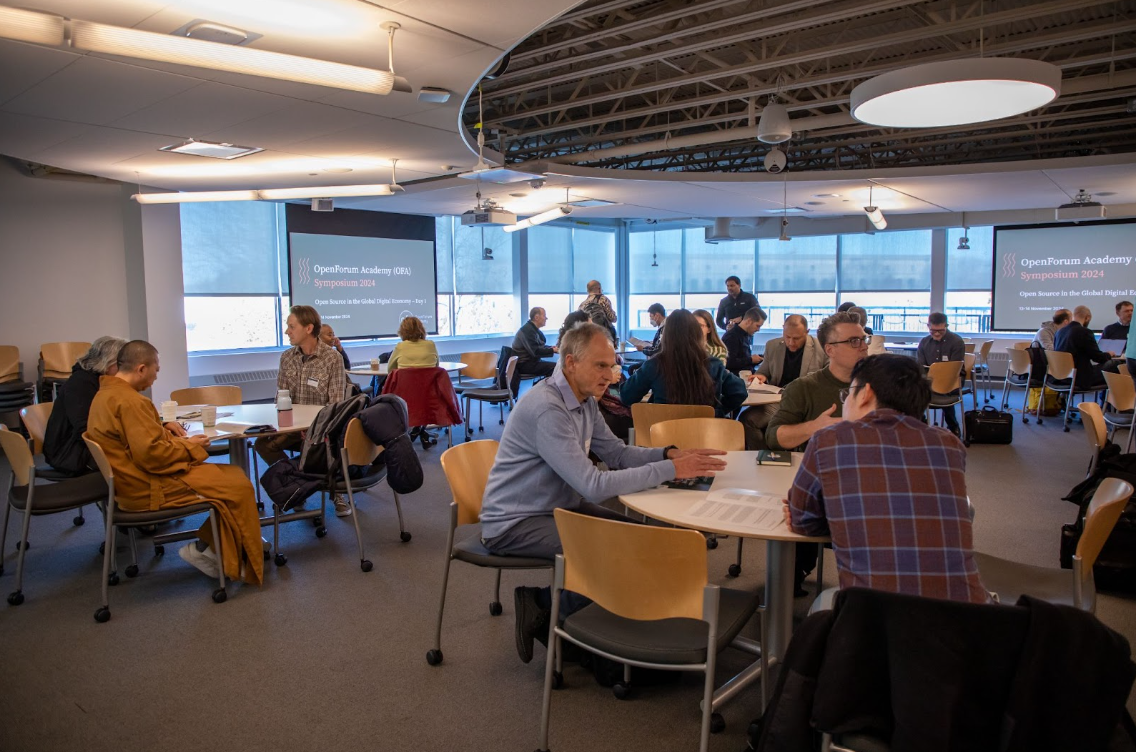
A view of the main room for the OFA Symposium 2024.
The OpenForum Academy (OFA) Symposium 2024 took place on November 13-14 in Boston, Massachusetts! Our new Materials page on the Symposium website includes papers and presentations from the various speakers, as well as photos from the event. Recordings will be published on our YouTube channel as soon as they are ready.
This unique conference underscored for us the critical importance of collaboration, innovation, and inclusivity in shaping open technologies research. This year’s edition was diverse and multidisciplinary, bringing together a mix of academics and practitioners from across the globe to share their latest research and insights on open source software and open technologies. With twice the number of presentations and a significant number more attendees compared to the previous edition, the Symposium was, we believe, a milestone for the open source research community.
So, what actually happened in Boston? And how did we get here in the first place?
A brief history of the OFA Symposium
The OFA Symposium was started in 2021 as an opportunity for OFE to host critical and scholarly discourse on open source. It was facilitated as an extension of the OpenForum Academy, our community of open source and open technologies researchers, who work globally as both academic and practitioners.
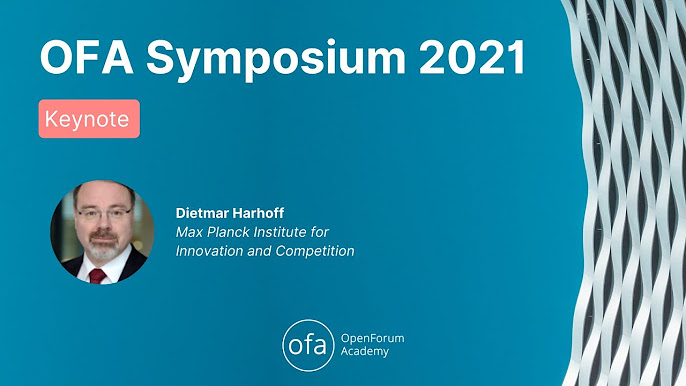
The 2021 edition of the OFA Symposium started online, during the COVID-19 pandemic.
The OFA Symposium 2021 discussion centred on the European Commission study on “The impact of Open Source Software and Hardware on technological independence, competitiveness and innovation in the EU economy”. It aimed to provide researchers in the field a chance to exchange on the latest open source research, identify research gaps, and contextualise their research with the findings from the European Commission study.
Since last year, we have begun scaling the OFA Symposium, building it out into a dedicated multidisciplinary conference for academics and practitioners interested in the social, political, and economic impacts of open source. The 2023 edition of the OFA Symposium was held at TU Berlin and welcomed over 60 researchers to Berlin to investigate a future agenda for open source research. And just last month, the 2024 edition was hosted by the Digital Data Design Institute at Harvard, evolving our concept further and raising the ambition level.
Recapping the OFA Symposium 2024
Under the theme Open Source in the Global Digital Economy, the OFA Symposium 2024 examined how open source is changing the way we work, communicate, and interact with each other, and how it is shaping the future of technology and society, in the context of a globalized digital economy.
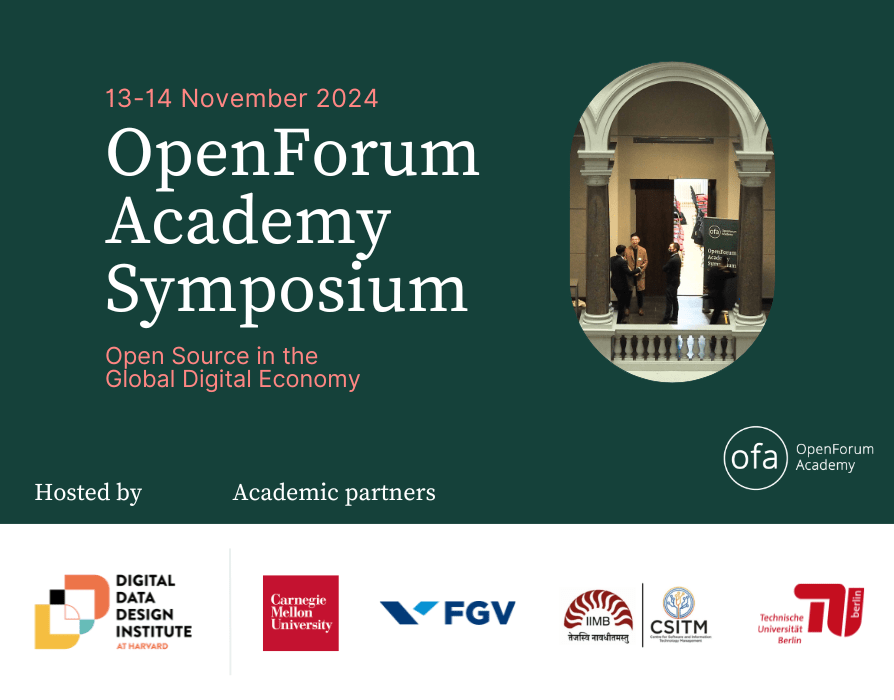
The 2024 edition of the OFA Symposium took place last month in Boston, November 13-14.
It was a truly global event which welcomed over 90 participants and speakers from over 30 different countries across the globe. Over two days, the Symposium featured the generous and thoughtful contributions of nearly 35 paper presenters, keynotes, and panel participants. We greatly enjoyed the interesting conversations we had with all the attendees and we are excited and humbled for all the input we received for future OpenForum Academy activities.
We’d like to extend our sincere gratitude to our Harvard University partners at the Digital Data Design (D^3) Institute at Harvard, who facilitated our use of the space at Batten Hall and supported the logistics. We would also like to express our thanks to our academic partners: Harvard Business School, Carnegie Mellon University, Technische Universität Berlin, the Indian Institute of Management Bangalore, and FGV Direito Rio.
Exciting keynote speakers and guests
The Symposium featured the distinguished contributions of four keynote speakers, two of which kicked off Days 1 and 2 of the event, and the others which kicked off each afternoon with a Fireside Chat.
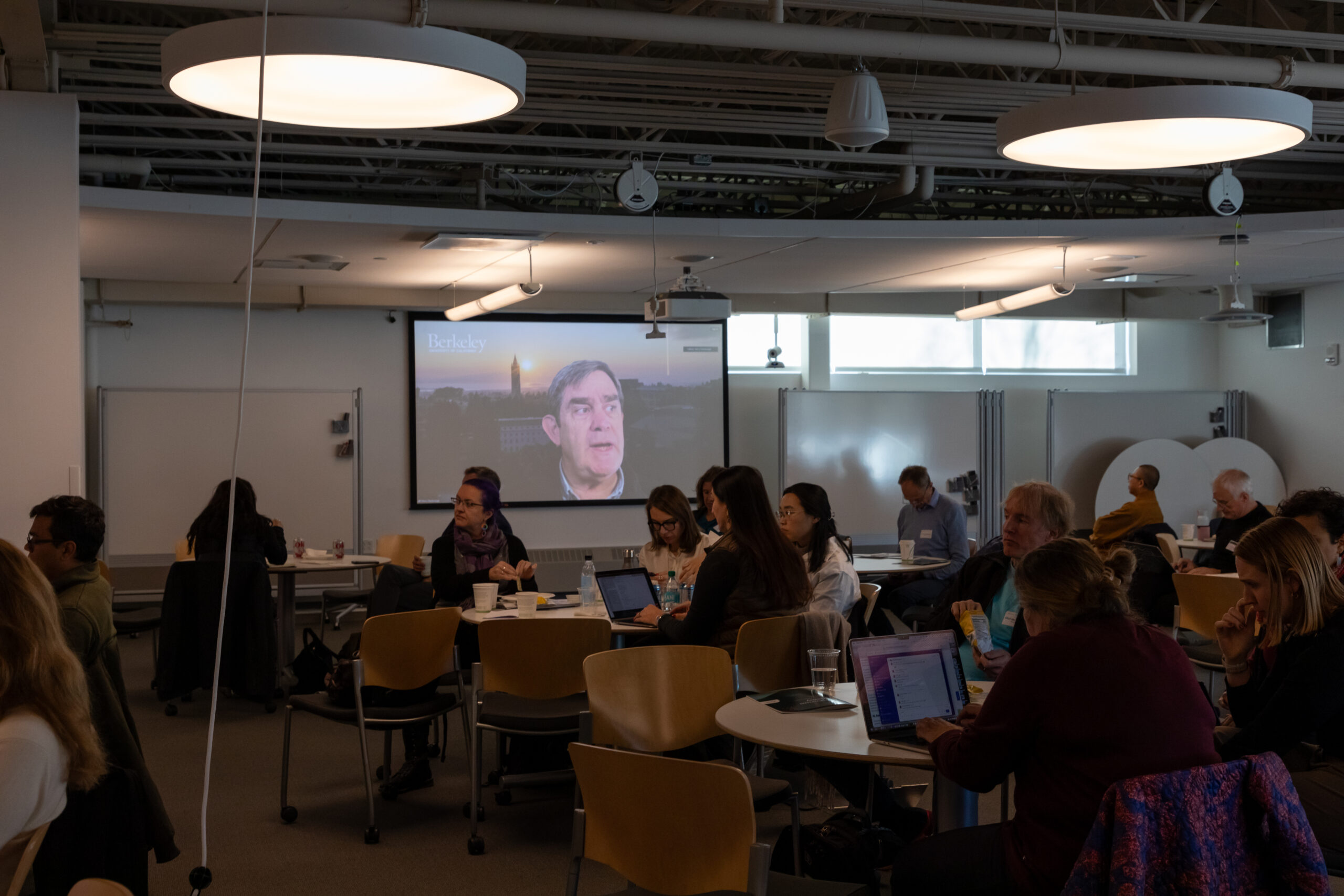
Dr. Henry Chesbrough, the ‘Father of Open Innovation’, gave a remote keynote as part of a Fireside Chat with Clare Dillon on Day 1.
On Day 1, we were thrilled to feature Brian Fitzgerald, the Director of Lero – the Irish Software Research Centre and a Professor Emeritus at the University of Limerick, who discussed the history and power of open technologies, laying the foundation for how we got to where we are in their study. We also had a discussion with Henry Chesbrough, Professor and Director of the Garwood Center for Corporate Innovation at UC Berkeley Haas, who discussed the past and future of the study of open innovation – a topic he himself helped to pioneer – in conversation with Clare Dillon.
On Day 2, we showcased the work of Katharina Meyer, the Director of the Digital Infrastructure Insights Fund, who surveyed her considerations from funding research related to open technologies and open infrastructures. OFE’s own Policy Advisor Nick Gates also moderated a discussion with Frank Nagle, Assistant Professor at the Harvard Business School, who discussed his work trying to understand the economics and economic impact of open source technologies.
Key takeaways and learnings
The 2024 Symposium explored six key themes: Funding and Open Source, Diversifying Open Source, Open Source Economics, Public Sector Adoption, Open Source and AI, and Ecosystems.
In the Funding block, discussions highlighted sustaining open source software (OSS) through innovative funding models. Stephen Jacobs explored team-based funding approaches, while Brigitta Németh examined firm involvement using Mozilla’s Rust ecosystem as a case. Papers by Cailean Osborne et al. and Konstantin Vinogradov called for systemic funding solutions to reimagine OSS as vital infrastructure, with a toolkit presented by Osborne’s team and an OSS endowment proposed by Vinogradov.
In the Diversity block, presentations emphasized non-code contributions and the underrepresentation of women and minorities. Aishat Muibudeen and Hana Frluckaj et. al highlighted these gaps, while Celina Agaton explored (F)OSS’s transformative potential in local economies. Jennifer Tridgell positioned OSS as a tool for global technology equity, looking at dynamics of technology transfer.
In the Economics track, Papers examined OSS value measurement and its role in innovation. Eva Maxfield Brown et. al proposed using GitHub data for valuation, and Jara Pascual et. al promoted open innovation for learning. Others examined dynamics within OSS economics, like Matt Germonprez et. al, who analyzed OSS supply chains, and Matteo Nebbiai, who linked digital value chains to individual/organizational behavior.
In the Public Sector track, discussions focused on OSS adoption and its role in digital maturity. Johan Linåker and Sachiko Muto analyzed Open Source Program Offices (OSPOs) and digital indices for OSS metrics. Eve Elie et al. examine the tDigital Public Goods (DPGs) in modernizing government, while Jan Krewer underscored Digital Commons’ potential as providers of public digital infrastructure.
In the AI track, papers explored many dynamics related to open source and AI., including the impact of AI on work and topics related to the governance of open source AI. Manuel Hoffmann et. al analyzed generative AI tools like GitHub Copilot, highlighting productivity and innovation but also ethical risks. Freyja Van den Boom warned of harmful licensing in AI-generated code. Iana Kazeeva and Ana Trisovic addressed regulatory challenges and the necessity of open AI models for scientific transparency.
In the Ecosystems track, contributions examined OSS dynamics and governance. Anne Herfurth et al. highlighted AI’s dual impact on developer productivity and autonomy, while Dawn Foster discussed licensing trends and community fragmentation. Hatta Masayuki critiqued concentrated power in OSS communities, and Ryan Ellis’ team examined the benefits and risks of OSS bug bounty programs.
For a detailed summary of the available papers and presentations, check out the new Materials page on the OFA Symposium 2024 website. Recordings will be published on our YouTube channel as soon as they are ready.
Honouring an emerging scholar with the Basil Cousins Award
We were also delighted to announce the winner of our annual winner of the Basil Cousins’ Award. In 2023, OFE and the OFA instituted the Award in memory of our co-founder, Basil Cousins, who passed away in early 2023. Basil was a pioneer in understanding the role of open technologies and open source in society, one of the reasons he started OFE.
This year’s Basil Cousins’ Award went to Jennifer Tridgell, a human rights lawyer by trade who now works as an independent legal consultant and PhD Candidate (International Law x Computer Science) at the University of Cambridge as a World Ramsay Scholar.
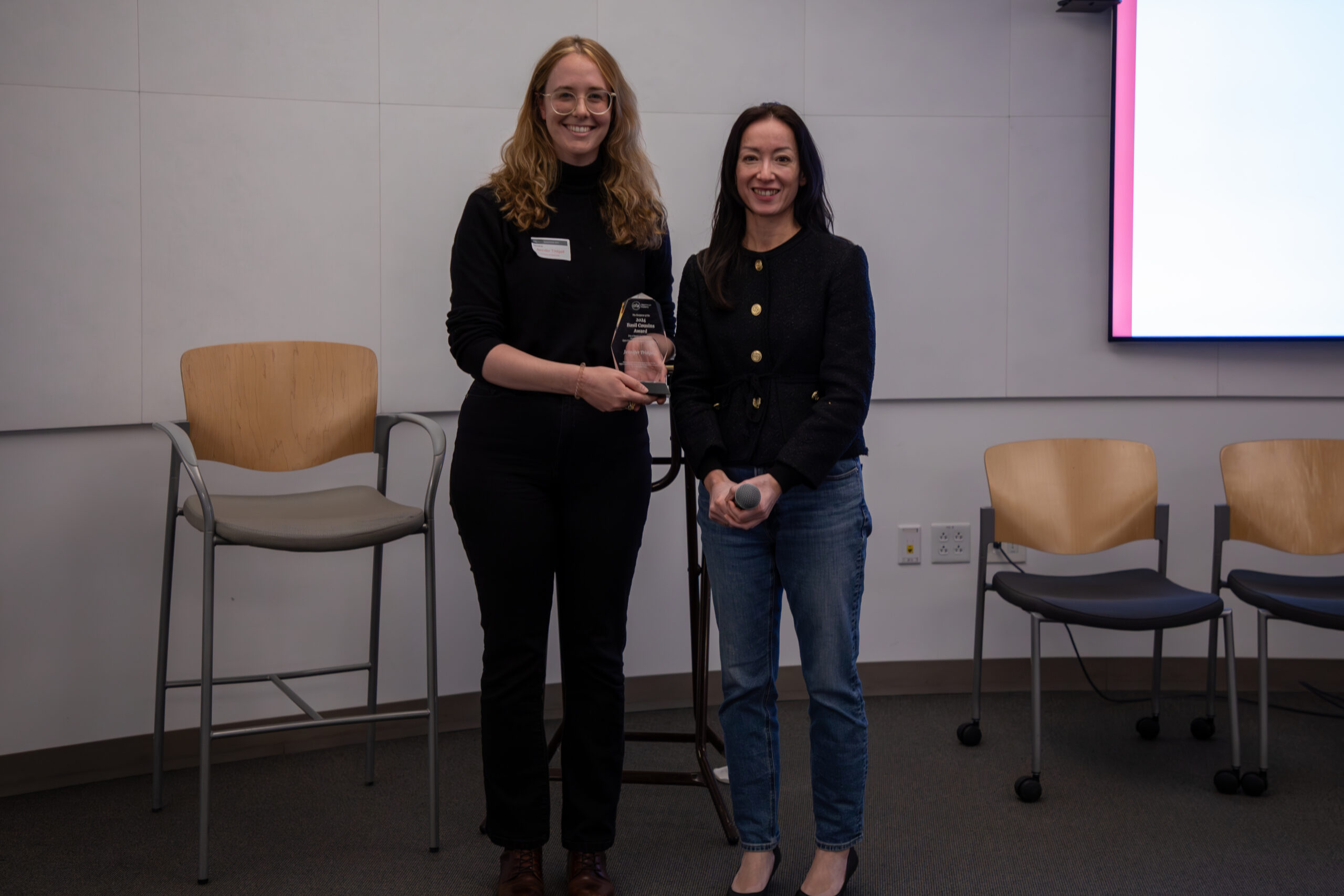
Basil Cousins’ Award winner Jennifer Tridgell (left) with OFE Chair Sachiko Muto.
As a PhD student and emerging open source scholar, Jennifer researches global governance of open source software, and her work for this conference focused on knowledge transfer between the Global North and the Global South, something of high relevance given the recent work we have done with the UN for OSPOs for Good 2024. By drawing attention to this under-researched issue, Jennifer has highlighted a potentially enormous contribution to the open source literature, which will only be expanded on in the years to come.
What comes next for the OFA?
The OFA is a community of academics and practitioners working on open source. While it has succeeded in engaging experts and sharing outputs year-after-year through the Symposium, we recognize that more intentional efforts will be needed to help it realise its full potential.
Attendees to the Symposium participated in collaborative brainstorming exercises wherein they contributed new ideas around funding priorities, publication and dissemination opportunities, and the need for more and better data for open source and open technologies research. These inputs will help OFE develop, introduce and eventually write a new Research Agenda – premised on the idea of Open Source Impact – to help guide the delivery of our thought leadership work.
Moving forward, we also hope to refresh the scope of the OFA, an historically informal network, into a truly collaborative community with dedicated backing, support infrastructure, and resources. The goal of the refreshed network – which we will announce in the lead up to the next Symposium – will be to generate new, multidisciplinary research that helps us to understand open source technologies and their role in our world.
While the OFA has historically maintained an emphasis on open source through the OFA Symposium, feedback has also pointed to the need for the OFA to double down its commitment to advancing scholarly research on all fields of open technologies. This initiative would be an ambitious effort to support the ongoing development and appreciation of open source software.
Join us next year!
The next edition of the OFA Symposium will be held in Rio de Janeiro, Brazil in November 2025! Stay tuned for more information. We will also share more details on the future of the OpenForum Academy in the months ahead.